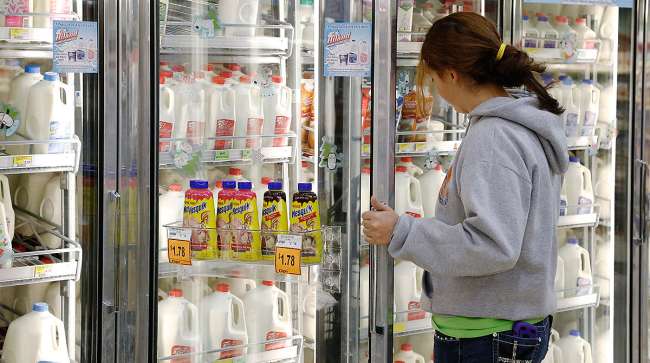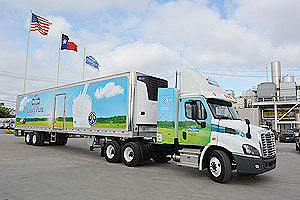Senior Reporter
Dean Foods Bankruptcy Should Have Little Impact on Trucking, Experts Say

[Stay on top of transportation news: Get TTNews in your inbox.]
Trucking and agriculture officials said the Chapter 11 bankruptcy filing by Dean Foods and its decision to sell its assets to the national milk marketing cooperative Dairy Farmers of America is not an indication of a broader problem in the sector, at least in the short term.
“I don’t think there’s really any kind of scenario here that says somehow food services, schools, grocery stores and ultimately consumers are going to have a hard time finding milk,” Andrew Novakovic, agriculture economist at Cornell University, said in an interview with Transport Topics. “There are going to be plenty of alternatives for picking up accounts. The total demand for trucks and trucking services I don’t see changing.”

Dairy Farmers of America reports U.S. milk sales dropped to $13.6 billion in 2018 from $14.7 billion in 2017 as plant-based milk and bottled water cut into milk’s market share.
Alternative milk products need the same refrigerated conditions and are hauled in the same fashion milk is now — in tank trucks.
Jon Samson, executive director of the Agricultural and Food Transporters Conference at American Trucking Associations, said for the most part, the equipment is interchangeable, and it doesn’t matter if the milk in the container truck is from a cow or a plant.
“As far as the refrigeration threshold, things are pretty much the same when they’re hauling those milk alternatives,” Samson said.
Dean Foods struggled to keep up with changing consumer habits. It was saddled with debt and saw the value of the company fall from $7 billion in 2010 to less than $300 million today, according to the Dallas-based company’s financial reports.
Before the bankruptcy filing on Nov. 12, Dean Foods had reported five consecutive quarters of losses, laying off hundreds of employees, and closing or consolidating several processing plants. Last year it closed plants in Kentucky, Georgia, Pennsylvania, Massachusetts, Illinois, Michigan and Minnesota.
And two of its four pension plans are listed as “critical,” according to the Pension Protection Act classification system.

Dean Foods
“They have had a couple of things that have been weighing them down pretty heavily. Probably the biggest one is just the declining per capita consumption of beverage milk,” Mark Stephenson, director of dairy policy analysis at the University of Wisconsin-Madison, told TT. “It’s a highly competitive market segment too. Thin margins, and declining sales, that’s not a good recipe for a profitable firm.”
According to U.S. Department of Agriculture milk consumption data, Americans drink 37% less milk than they did 50 years ago. In the late 1960s, the average person drank more than 30 gallons of milk a year; now, it is about 18 gallons.
Still, one of the biggest challenges for the dairy industry is overproduction. The USDA said monthly milk production had jumped more than 15% in nine years because of better breeding, and improved nutrition and farm management techniques.
Each day, thousands of gallons of milk are delivered on tanker trucks from dairy farms to processing facilities, where it is pasteurized and bottled, then shipped to grocery stores and other retail outlets.
There are also renewed hopes for increased U.S. dairy exports to Mexico and Canada under a proposed three-nation trade agreement, and a possible deal with China, according to Stephenson.
“We’re always going to need trucks to transport milk,” said Samson.
Dean Foods ranks No. 42 on the Transport Topics Top 100 list of Private Carriers and No. 4 on the Top Agriculture & Food Processing Carriers.
Want more news? Listen to today's daily briefing:

